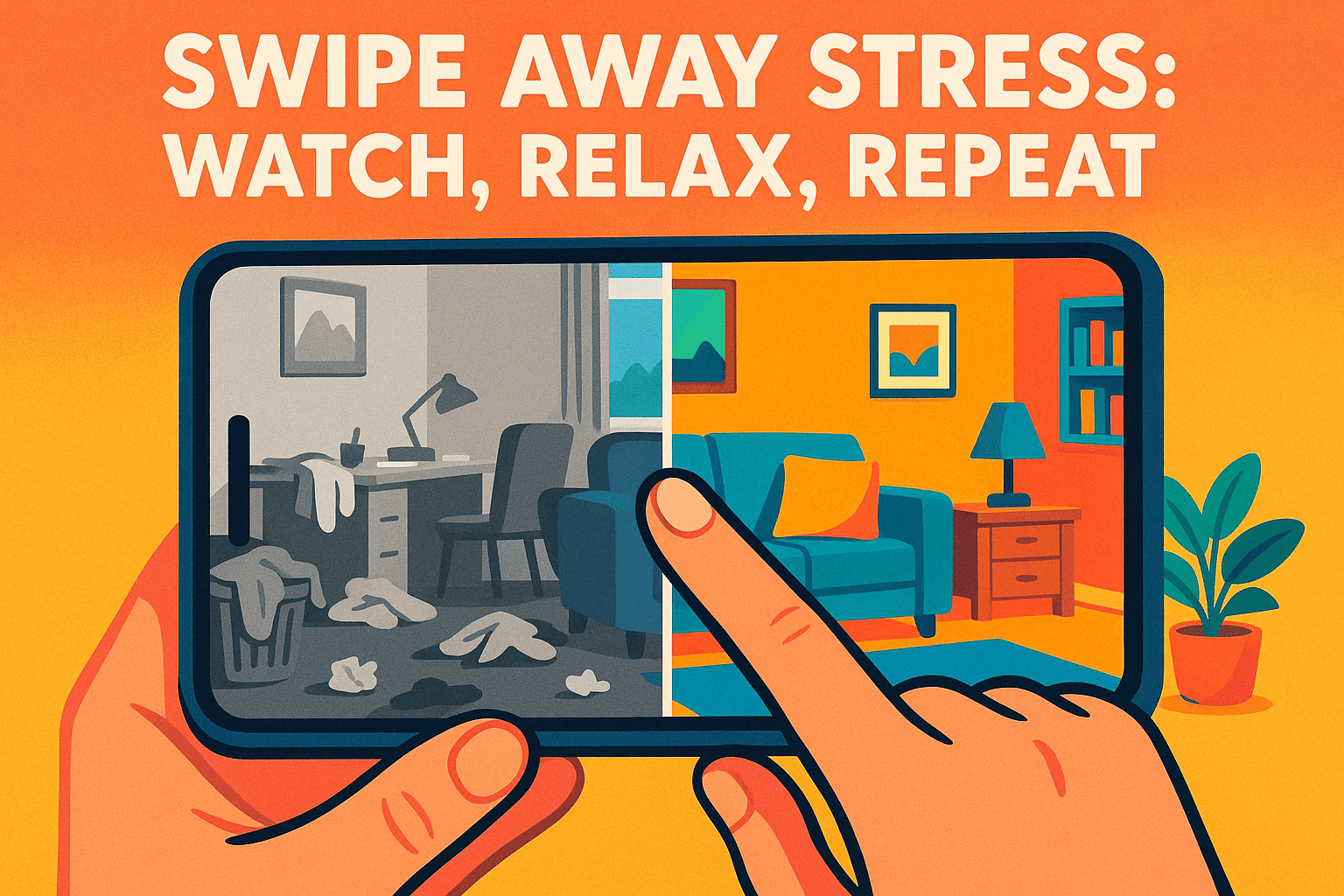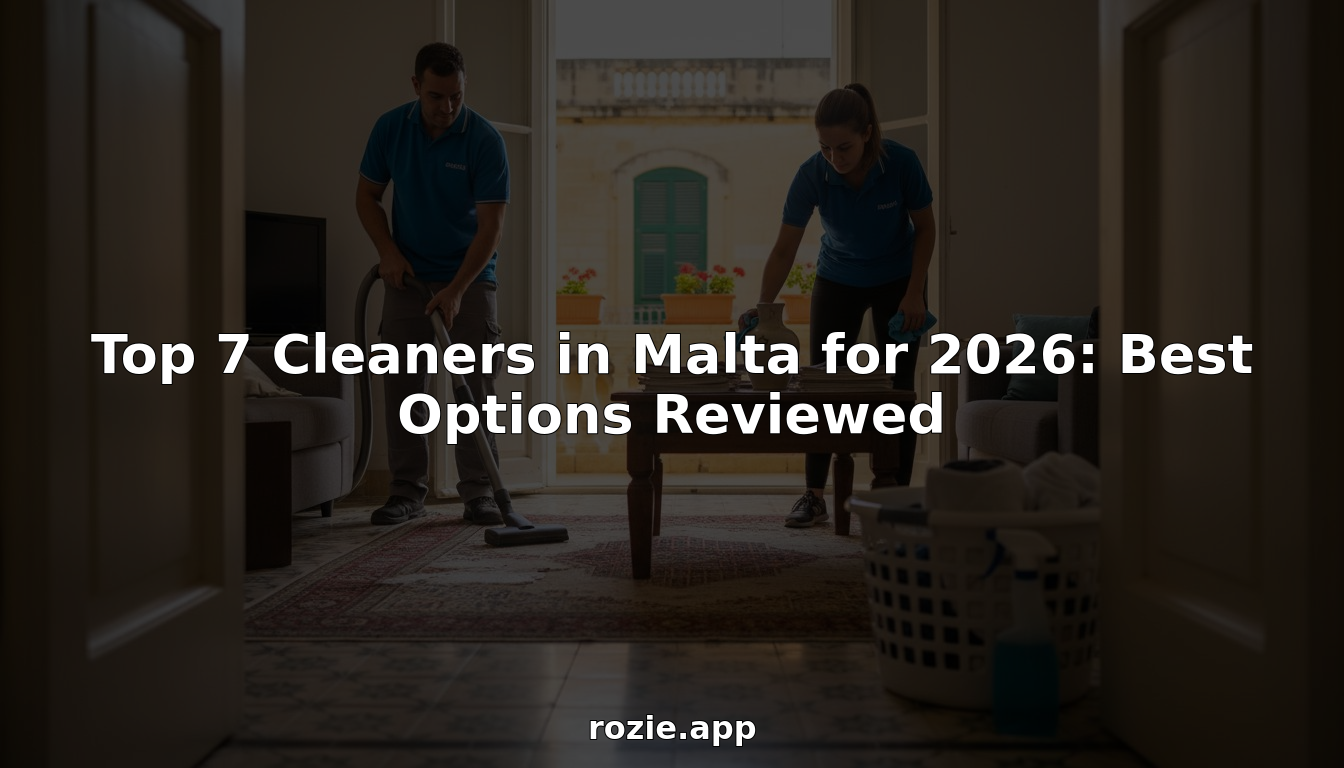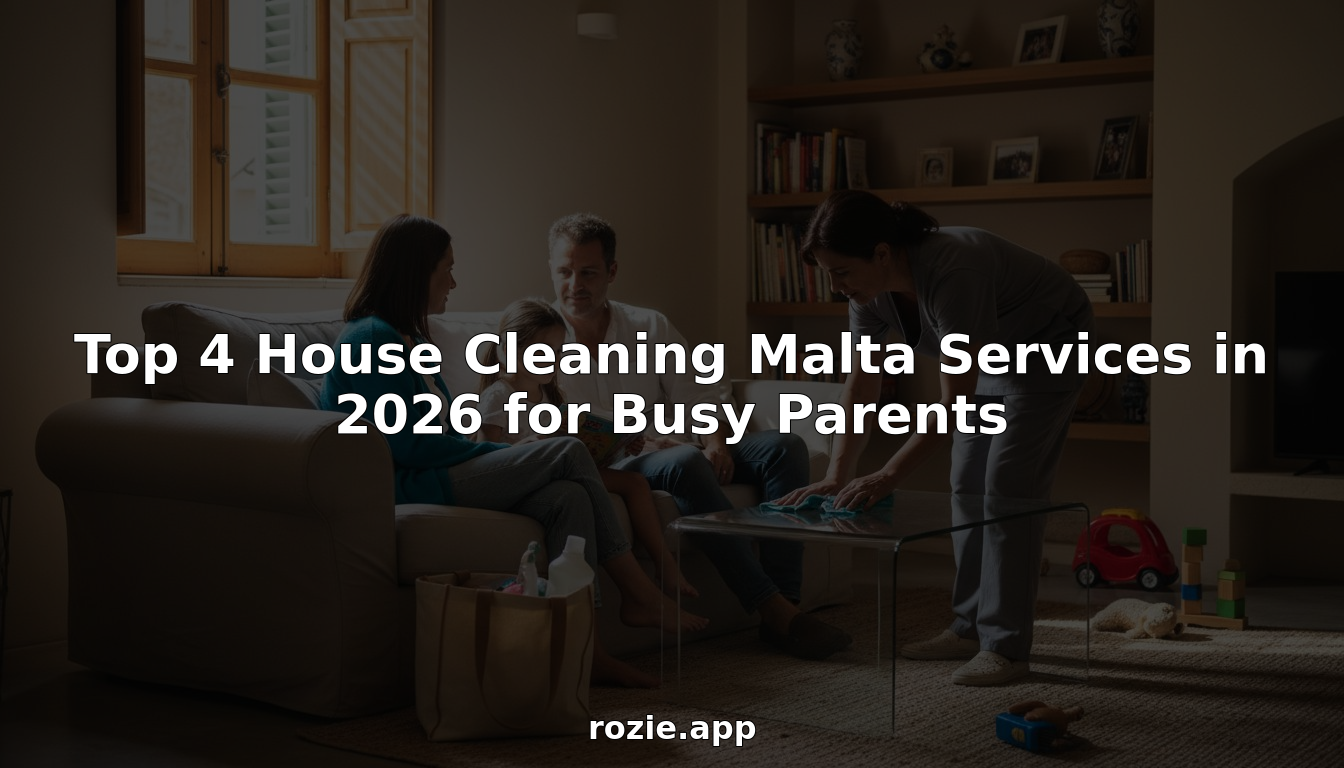On a breezy evening in Valletta, a 29-year-old professional comes home exhausted. Instead of heading out or firing up Netflix, she does something curious: she opens her phone and watches a stranger scrub a kitchen sink until it sparkles. For a growing number of people, the most soothing part of the day isn’t a glass of wine or a meditation app – it’s watching someone else clean. These videos of mopping floors and organizing pantries have become an unlikely cultural phenomenon, attracting millions of viewers (including plenty in Malta) who find them oddly satisfying. It sounds almost ridiculous: why would anyone relax by watching chores or cleaning comapnies videos? And yet, if you scroll through TikTok or YouTube, you’ll find countless comments admitting that a five-minute clip of a fridge deep-clean is the perfect way to unwind. Something surprising is happening here. What is it about mundane ASMR cleaning videos that has so many of us hooked – and what does this trend say about our modern lives, from Malta’s busy households to the wider world?
Cleaning videos and ASMR.
It turns out that watching a grimy oven transform into a gleaming one has a universal appeal. Part of the draw is that each video delivers a mini-story: chaos to order in one minute flat. A stained countertop goes from disaster to gleaming, and viewers get the instant gratification of seeing a problem solved. “Oddly satisfying” is the common refrain. The content is engineered to hit that pleasure spot. Clips are often paired with soothing music or left with just natural cleaning sounds, leveraging ASMR effects – the soft swish of a brush, the tap-tap of a spray bottle – to indulge your senses. For those who experience ASMR (short for autonomous sensory meridian response), these gentle, repetitive noises can trigger a tingling calm that washes over the body. Even if you don’t get the full tingle, the quiet, rhythmic sounds of a sponge wiping a surface or a vacuum humming on carpet have a strangely hypnotic quality. It’s as if the white noise of chores helps drown out the buzz of our anxious minds for a moment.
Then there’s the sheer scale of the community. Influencers with usernames like @CleanQueen or @OperationNiki boast followings in the millions. One viral cleanfluencer, for example, amassed 4.3 million followers just by filming herself deep-cleaning hotel rooms. Another posts a weekly “Sunday reset” video, efficiently blitzing through an entire apartment’s mess in hyperlapse. There are even creators who do nothing but restock pantries – artfully filling clear jars with cereals and snacks – to satiate viewers who crave that organized aesthetic. In an era where so much online content is frenetic or provocative, these cleaning clips feel wholesome and calming. They offer a judgment-free zone where a shiny sink can symbolize a small victory. It’s easy to see why billions are tuning in to CleanTok for comfort.
@rozieapp Whoa! 🫨 Are those the sounds of purity? 😍💦🛀🧹 malta asmr fyp fypシ reels trending cleaning explore islandlife
♬ original sound – rozieapp – Rozie App
The Psychology of a Satisfying Clean
Why do these videos feel so therapeutic? Psychologically, the appeal of ASMR cleaning videos taps into a few powerful things. First, order and control. In a world that often feels chaotic, watching a mess get methodically tamed scratches a primal itch. “It began to fuel my compulsion to clean and organize my life, which I was doing to feel like I’m in control when I’m feeling anxious,” one 26-year-old woman admitted of her TikTok cleaning habit. That sense of control – even vicariously through a screen – can be deeply reassuring when you’re stressed. Every swipe of a rag or perfectly arranged drawer is like a promise that chaos can be overcome, one tidy drawer at a time.
There’s also a clear sensory reward at work. ASMR researchers describe how certain triggers – gentle tapping, scratching, pouring sounds – can lull the brain into a relaxed, almost meditative state. Cleaning videos often deploy exactly those triggers: the shhh of bristles on carpet, the click of a reorganized cabinet, the before/after contrast that gives the brain a hit of dopamine. According to Phillyvoice Studies have found that ASMR content can measurably reduce anxiety, slow the heart rate, and induce feelings of calm. In other words, that strange tingling relaxation people report is real, and it has physiological benefits. “Come back to the present moment… forget about what might be,” is how one therapist explained the effect – ASMR helps people shut out worries and center themselves in the now. For a viewer flopped on the couch after a long day, watching someone fold laundry with methodical precision can be a form of mindfulness. The mind quiets down, lulled by the simple, repetitive task on screen.
There’s even an element of storytelling and empathy involved. Humans love a good narrative, and there’s a tiny narrative in every cleaning video: Problem (messy room), Process (scrub, sort, rinse, repeat), and Resolution (spotless beauty). It’s the same satisfaction we get from finishing a project or seeing justice served in a movie – here it’s just on a micro, domestic scale. And psychologically, seeing someone care for a space – even if it’s just wiping down a counter – can stir a gentle emotional response. It’s comforting to watch people take care of things; it reminds us of caring and being cared for. No wonder some find these videos emotionally uplifting, not just visually pleasing.
However, this trend isn’t universally positive for everyone. For a minority of viewers, the constant parade of immaculate homes can set unrealistic standards. What starts as inspiration can turn into pressure. In the UK, mental-health counselors have noted that some CleanTok addicts start feeling anxiety about their own homes not being Pinterest-perfect. The videos are, after all, staged to look ideal – often using excessive methods (one influencer uses 12 different cleaners on a single bathtub for the visual effect) that no normal person would replicate every week. So it’s important to take the right lesson from these clips: enjoy the satisfaction, but don’t beat yourself up if your kitchen sink has a few water spots. By and large, though, most fans of cleaning videos say the content motivates them or simply calms them without any negative side effects. Like a modern take on watching a fireplace or aquarium, the steady, gentle progress of someone tidying up can be a genuine balm for the nerves.
Chores, Time Scarcity, and Modern Overwhelm
One ironic truth behind the rise of relaxing cleaning videos is that many of us are too busy and burned out to clean as much as we’d like in real life. The people glued to #CleanTok at 10 p.m. are often the same folks who haven’t had time to vacuum their own living room in a week. Modern adulthood – demanding jobs, family responsibilities, the always-on digital barrage – leaves us chronically short on the energy needed for housekeeping. The result? We procrastinate on chores, yet we crave the peace of a clean environment. Watching someone else declutter a closet scratches that itch without requiring effort when we have nothing left to give.
This dynamic especially rings true in fast-paced, hardworking cultures. Here in Malta, for example, people put in long hours and face intense time pressure at work. In fact, a survey reported by Businessnow.mt found Maltese employees are among the most likely in Europe to “always” feel under time pressure on the job . It’s no surprise, then, that when free time is scarce, scrubbing the bathtub falls to the bottom of the to-do list. (After a 50-hour workweek and shuttling the kids around, who has the energy to mop floors?) Yet the desire for a tidy home doesn’t go away. We still associate a clean space with relaxation, productivity, even self-respect. So we end up in a curious bind – yearning for cleanliness, but too time-starved or tired to attain it. The massive popularity of CleanTok in Malta and globally is, in a sense, a reflection of that bind. It’s easier to watch a satisfying cleaning video for 5 minutes than to muster the motivation for a real 50-minute clean of your own kitchen.
The data bears out how much of a commitment cleaning can be. One survey found the average person spends about 6 hours per week on household cleaning chores. That’s almost a full workday’s worth of scrubbing, sweeping, and tidying each week. Many people end up relegating these tasks to Sunday afternoon, sacrificing downtime to catch up on laundry and dishes. And let’s be honest: unlike the curated joy of a #CleanTok clip, real-life cleaning is often tedious, sweaty, and time-consuming. It doesn’t always end in a picture-perfect “after” scene – but it still needs to get done. All of this feeds the appeal of living vicariously through someone else’s cleaning. It’s a guilt-free break because hey, at least something is getting cleaned, even if it’s on a screen.
From Virtual Zen to Real-Life Clean (Reclaiming Time and Clarity)
The popularity of ASMR cleaning videos has an interesting side effect: it shines a spotlight on the value of a clean space for our mental well-being. That sparkling kitchen in the video represents peace, clarity, a sense of accomplishment – things we all want in our own homes. Realizing this has led many busy people to a smart conclusion: if you can’t find the time or will to clean, why not outsource it? After all, the ultimate ASMR experience might be coming home to a freshly cleaned apartment that you didn’t have to scrub yourself. You get the same calm and satisfaction – but in real life.
Malta’s cleaning companies and services are transforming orderly dreams into simple reality.
It’s in this context that a new wave of services has emerged to bridge the gap between our messy homes and our tidy aspirations. In Malta, cleaning help is becoming easier to get than ever. Rozie.app, was founded precisely to help people reclaim their time and mental clarity. It’s a Malta-based cleaning service platform (imagine an Uber for house cleaning) that connects customers with trusted Malta cleaners on-demand. With just a few taps, you can book a verified cleaner to come tackle the dust and grime while you’re at work or out enjoying your weekend. The idea is simple: less time scrubbing, more time for yourself. Rozie’s approach is catching on because it turns out lots of people would love to delegate the drudgery of mopping floors and cleaning toilets. You can relax or focus on work while a professional takes care of the mess. And when you walk into your home afterward, it’s like walking into your very own CleanTok “after” scene – fresh, organized, and stress-relieving. You can also find lots of viral videos at Rozie app Instagram page.
What’s notable is how services like this are reframing cleaning as self-care rather than a burden. Instead of feeling guilty for not doing it all, many are realizing that hiring a cleaner or using a platform like Rozie is a way to invest in your well-being (and support skilled cleaners with work, too). In a place as busy and modern as Malta, this concept is especially appealing. Professionals in their late 20s, 30s, and beyond often juggle demanding careers and family obligations. Their free time is precious. By using an efficient cleaning service to handle the dirt, they effectively buy back hours of their life. They also buy peace of mind: no more stressing about the dusty shelves you haven’t wiped or that pile of laundry haunting you from the corner. A clean home gives mental clarity. It’s easier to think, relax, and even sleep when your environment feels in order – that’s one reason a tidy space is linked to lower stress. In a way, outsourcing the chore is tapping into the same psychology that drives people to ASMR cleaning videos, but with a concrete payoff. You’re not just watching calm and order; you’re living in it.
Even traditional cleaning companies have felt the ripple effect of this cleaning-as-therapy trend. You could say the Malta cleaning industry as a whole benefits whenever cleanliness is “cool” again. The surge of interest in decluttering and deep-clean transformations (fueled by everyone from Marie Kondo’s KonMari method to #CleanTok influencers) has made people more appreciative of what a good cleaning can do. It’s not merely about having a spotless floor – it’s about achieving a calmer mindset. That means hiring a cleaning service is no longer seen as a lazy shortcut, but as a practical step toward a better quality of life. Malta cleaners and agencies have noted that clients today talk not just about cleanliness, but about time saved and stress reduced. When you frame a cleaning service as helping you regain two free hours to hit the gym, read a book, or play with your kids, it suddenly sounds downright sensible.
Coming Clean: Why We Crave That Sparkle
In the end, our fascination with ASMR cleaning videos reveals something profound about contemporary life. We live in an age of information overload, perpetual multitasking, and pandemic-tinged anxiety – our brains are cluttered, and so are our calendars. Amid all this, the image of a tidy, gleaming home has become a symbol of the calm and control we yearn for. A 30-second clip of a messy room being set right scratches that itch in our psyche, assuring us subconsciously that the world can be put in order. It’s the same reason we feel so good after we finally organize that chaotic closet or finish doing the dishes: it’s not really about the clean dishes, it’s about the sense of clarity and accomplishment that comes with it.
Whether we get that feeling by watching a satisfying video on our lunch break or by outsourcing the labor to a helpful cleaner, the goal is the same. We’re seeking a bit of peace and mental space in our hectic day-to-day existence. The trend might have started online, but its resonance is deeply offline and human. It speaks to the value of caring for our environment and ourselves. As our Vallettan professional finishes her video and looks around her apartment, maybe she feels inspired to at least put away a few clothes – or to book a cleaning service for the weekend. Either way, the therapeutic promise of cleanliness has worked its way into her mind.
The cultural insight here is that something as ordinary as cleaning has taken on an extraordinary role as a refuge from modern stress. We’ve turned the age-old chore of scrubbing floors into shareable entertainment, and we’ve turned cleaning services into a lifestyle upgrade. There’s a poignant little paradox in it: we watch cleaning videos to relax, and then hire cleaners to free ourselves from stress. It all comes down to reclaiming balance. In a world that often feels messy and overwhelming, a clean space – whether achieved via digital escapism or a real-life helping hand – offers a glimpse of harmony. And for many of us, that sparkling sense of order truly does “spark joy,” in ways we never expected a bucket of soapy water ever could.
UPDATE: Malta cleaning price calculator (2025 edition)
FAQ
Q: What is #CleanTok and why is it so popular?
A: CleanTok is a nickname for the cleaning-obsessed community on TikTok (and other social platforms). Millions of people share short videos of cleaning hacks, satisfying before-and-after transformations, and day-in-the-life cleaning routines. It’s popular because watching messy spaces get magically cleaned is oddly satisfying and relaxing for viewers — the hashtag has garnered over 150 billion views from people who enjoy these transformations.
Q: What does ASMR mean in the context of cleaning videos?
A: ASMR stands for Autonomous Sensory Meridian Response, a tingling, relaxing sensation some people get from certain gentle sights and sounds. Many cleaning videos double as ASMR content: the soft swish of a broom, the sound of spraying water, or just the visual of orderly progress can trigger a calming effect. In other words, these “ASMR cleaning videos” are popular because they help people unwind and relieve stress, almost like a form of meditation.
Q: How can hiring a professional cleaner reduce my stress?
A: Outsourcing your house cleaning to a professional service can take a huge weight off your shoulders. Instead of feeling guilty or anxious about the mess when you’re already busy, you can come home to a clean space without doing the work yourself. This frees up your time and mental energy. Research even suggests that spending money to save time — for example, by hiring cleaners — can make people happier and less stressed, because it lets you focus on rest, family, or other priorities.
Q: Where can I find some nice videos about cleaning ?
A: Check Rozie Instagram to find many different videos including ASMR cleaning videos.
Q: What is Rozie.app and how does it work?
A: Rozie.app is a Malta-based cleaning services platform (available as a mobile app) that makes it easy to book a vetted cleaner on demand. You simply enter your location and cleaning needs, pick a time, and Rozie connects you with a trusted local cleaning professional. It’s like booking a ride or food delivery, but for cleaning your home. The goal is to provide a hassle-free, reliable way to get your house cleaned by a professional cleaner, so you can save time and enjoy a pristine home without the stress. Plus, Rozie’s team is active on Instagram, sharing cleaning tips and satisfying clips, so you can get inspiration and see the results they deliver in real Maltese homes. Book verified cleaner with Rozie in minutes!
Download Rozie today:

Aleksandrs Tuls
| Author & Co-Founder, Rozie
Co-creator of Malta’s first on-demand cleaning app, Aleksandrs distils
real-world data into quick home-care hacks and business insights.
Featured in Yahoo Finance.
Connect on LinkedIn
.



